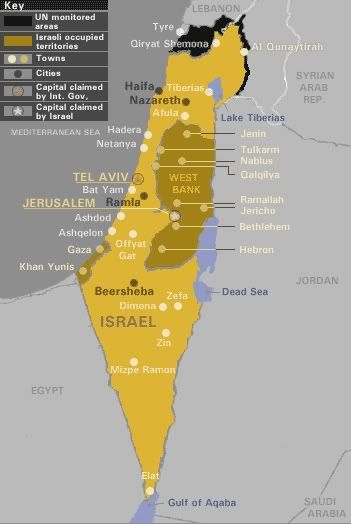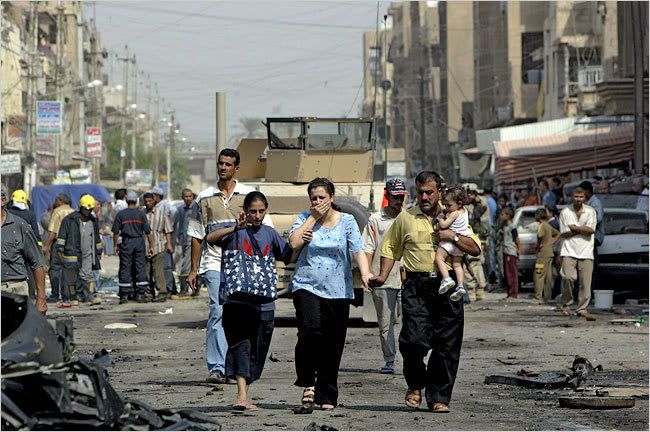Israel, against the stereotypes of many, is beholden to American influence in the Middle East. Saudi Arabia and Iran are now rising powers in the region, involving a Saudi backlash to an Iranian insurgence in the wake of the American invasion of Iraq.
Israel has been resigned to a position of proxy in the eyes of Arab states, and confidence in its own military's ability to execute has lowered for most Israelis. The country is extremely tense and depressed because of its Prime Minister's ability to disappoint an increasingly disillusioned public. More so than a war being characterized by poor decisions, the onslaught of corruption scandals and the ability of the corrupt to get away with their improprieties is gashing the collective surface of Israeli society's skin.
But there is a cap on a pressured euphoria. The disillusionment with alternative agendas, thanks to the corruption and inhibitions of Kadima's leadership and the failed venture of the Gaza Disengagement, have Israelis thinking more conservatively.
The ultra-left Peace Now organization criticized Thursday's Tel Aviv demonstrations as lacking an alternative solution to the state's ills, rather than a simple demand for Ehud Olmert to step down. The movement is taking an unusually misplaced stance on the political upheaval, trying to defend Ehud Olmert and his government's deserving to stay in government.
Peace Now fears the support for withdrawing from the West Bank is waning. The reality is Peace Now is only joining a chorus made up of current government ministers and Kadima parliamentarians who are committing political suicide by attempting to save Ehud Olmert.
When Olmert resigns, the euphoria that will have been uncorked will provide Israelis with an opportunity to install a practical vision for Israel's future into power. The sad thing is there is no profound party, nor candidate, waiting for the votes to implement this installation.
Israel's foreign and domestic policies are intertwined. All countries' are in this region. Control over the environment is essential to counter both Saudi and Iranian influence in the Middle East, and to begin handling the mounting crisis of the Iraqi refugees flooding Israel's neighbors.
With a solid control over the West Bank, Israel can control a massive reconstruction program that would put the keys back into the Israeli drivers' hands. Being forced into an arbitrary withdrawal from the West Bank before security can be guaranteed for Israel is an impossible scenario. Israel would be in need to resolve itself to fighting more wars with a new and unstable state on its borders.
Throughout the peace process, Palestinian autonomy has been emphasized over Israeli security. The reality is that Palestinian autonomy is unsustainable without Israeli security, for whose lack of it would force Israel into new armed conflicts with Palestinian militias and rocket squads.
Israel's strongest asset is its economy, having grown in spite of a major war that threatened a third of the state last summer. Considering this, Israel's economic clout is essential to maintaining a peace with the Palestinians of the West Bank (and Gaza).
A focused campaign of Israeli-monitored reconstruction would enable Palestinians to jump-start their economy, and at the same time be intertwined with the Israeli investment into its rise. Economic interdependence would create a mutual incentive to avoid war, and provide Israel with the financial and physical security necessary to allow Palestinians more openness.
Additionally, Israel's planned expansion into other regions of the country should enable it incentives for further environmental and technological research and development. This R&D will invite a new resurgence in scientific study in the country and a more active international element in the slew of studies the research programs at institutions like Ben Gurion University and the Weizmann Institute would conduct.
Israel's numbers necessitate the creation of stronger financial networks throughout the region to enable itself to gain more in terms of resources, particularly water.
The country essentially needs a leadership that can consider all these factors and provide Israel with the ability to foster as a regional influence. Israel needs to consider its ability to develop better relationships with its Arab neighbors for future years, and in order to create investments and interests for itself in its immediate neighbors, particularly Jordan, Egypt and the West Bank.
It must become a state that enables all its citizens to contribute to the state's growth, at the same maintaining its integrity as a Jewish state. This can be done without a problem, and it need not exacerbate already prevalent sectarian overtones in Israeli society. Avoiding the trap of restriction is vital to Israel's ability to break the necessity to capitulate to problematic compromises which may itself hurt Israel's own ability to grow.



